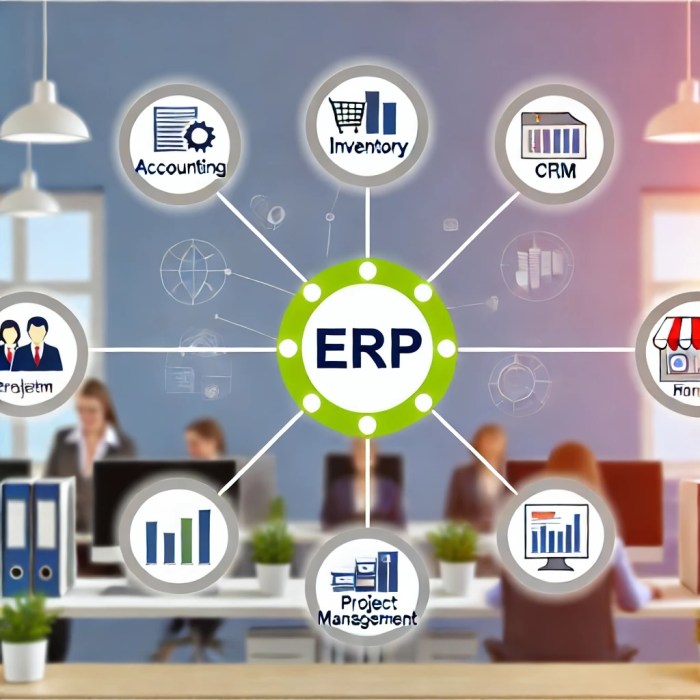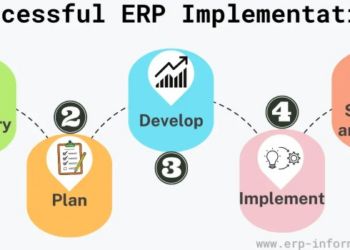Exploring the world of ERP systems for small businesses, this introduction sets the stage for a deep dive into how these systems can revolutionize operations and decision-making. With a focus on clarity and engagement, readers are invited to uncover the benefits and considerations of implementing an ERP system for small businesses.
Detailing the essential features and advantages of ERP systems tailored for small businesses, this discussion aims to equip business owners with the knowledge needed to make informed decisions.
What is an ERP system for small businesses?

An Enterprise Resource Planning (ERP) system for small businesses is a software solution that integrates various business functions and processes into a single system. This allows small businesses to manage their operations more efficiently and effectively.
Key Features of an ERP system suitable for small businesses
- Centralized Database: An ERP system provides a centralized database where all data is stored, making it easier to access and manage information.
- Integrated Modules: ERP systems typically include modules for various functions such as accounting, inventory management, human resources, and customer relationship management.
- Automation: ERP systems automate routine tasks, reducing the need for manual intervention and improving accuracy.
- Scalability: ERP systems are scalable, allowing small businesses to add new modules or users as they grow.
- Real-time Reporting: ERP systems generate real-time reports, giving small businesses access to up-to-date information for decision-making.
How an ERP system can streamline operations for small businesses
ERP systems streamline operations for small businesses by:
- Improving Efficiency: By automating processes and providing real-time information, ERP systems help small businesses operate more efficiently.
- Reducing Costs: By eliminating redundant tasks and improving resource allocation, ERP systems can help small businesses reduce costs.
- Enhancing Communication: ERP systems facilitate communication and collaboration among different departments, improving overall coordination.
- Enhancing Customer Service: With access to customer data and insights, small businesses can provide better customer service and personalize interactions.
Examples of industries that can benefit from implementing an ERP system
- Retail: Retail businesses can benefit from an ERP system by managing inventory, sales, and customer data more effectively.
- Manufacturing: Manufacturing businesses can use an ERP system to streamline production processes, manage supply chains, and improve quality control.
- Services: Service-based businesses can benefit from an ERP system by better managing projects, resources, and client relationships.
- Hospitality: Hospitality businesses can use an ERP system to manage reservations, inventory, and customer preferences more efficiently.
Benefits of implementing an ERP system for small businesses
Implementing an ERP system can bring numerous advantages to small businesses, ranging from improved efficiency to cost-saving opportunities and enhanced decision-making processes.
Improved Efficiency
- Centralized Data: With an ERP system, small businesses can store all their important data in one centralized location, making it easier to access and manage information.
- Streamlined Processes: ERP systems automate routine tasks and workflows, reducing manual errors and increasing overall efficiency in day-to-day operations.
- Enhanced Communication: By providing real-time updates and collaboration tools, ERP systems facilitate better communication among employees, leading to smoother business processes.
Cost-saving Advantages
- Economies of Scale: Small businesses can benefit from cost savings through bulk purchasing and streamlined processes enabled by an ERP system.
- Reduced Operational Costs: By eliminating redundant tasks and optimizing resource allocation, ERP systems help small businesses cut down on operational expenses.
- Improved Inventory Management: With accurate forecasting and inventory tracking features, small businesses can reduce excess inventory and avoid stockouts, ultimately saving costs.
Enhanced Decision-making Processes
- Real-time Insights: ERP systems provide small business owners with real-time data and analytics, enabling informed decision-making based on accurate information.
- Integrated Reporting: By consolidating data from various departments, ERP systems offer comprehensive reports that aid in strategic planning and decision-making.
- Forecasting Capabilities: ERP systems help small businesses forecast trends and anticipate future demands, allowing for proactive decision-making and better resource allocation.
Considerations for selecting an ERP system for a small business

When choosing an ERP system for a small business, several factors need to be taken into account to ensure the right fit for the specific needs and goals of the organization. From comparing different software options to evaluating compatibility with existing infrastructure, here are some key considerations to keep in mind
Compare different ERP software options available for small businesses
- Consider the size and complexity of your business: Some ERP systems are designed for larger enterprises with intricate operations, while others are tailored for small businesses with simpler needs.
- Assess the features and functionalities offered: Look for software that includes modules relevant to your industry, such as inventory management, accounting, human resources, and customer relationship management.
- Evaluate the scalability and flexibility of the ERP system: Ensure that the software can grow with your business and adapt to changing requirements over time.
- Compare pricing and licensing options: Take into account the initial investment, ongoing maintenance costs, and any additional fees associated with the ERP system.
Discuss scalability factors to consider when choosing an ERP system for a small business
- Look for cloud-based solutions: Cloud ERP systems offer scalability by allowing you to easily add or remove users, storage, and features as your business expands.
- Consider modular implementations: Opt for an ERP system that allows you to start with essential modules and gradually add more functionality as needed, without disrupting operations.
- Ensure integration capabilities: Choose an ERP system that can seamlessly integrate with other software applications used in your business, avoiding data silos and streamlining processes.
Provide tips on how to evaluate the compatibility of an ERP system with the existing infrastructure of a small business
- Conduct a thorough system audit: Identify the current software, hardware, and IT infrastructure in place to determine how well an ERP system will integrate and operate within the existing environment.
- Consider data migration and customization requirements: Assess the ease of transferring data from legacy systems to the new ERP system, as well as the level of customization needed to align with specific business processes.
- Consult with IT experts or vendors: Seek advice from professionals who can assess the compatibility of different ERP systems with your infrastructure and provide recommendations based on your unique needs.
Implementation and Integration of an ERP System for Small Businesses
Implementing and integrating an ERP system for a small business is a crucial step towards improving efficiency and streamlining operations. It involves several key steps to ensure a successful adoption and integration with existing software solutions.
Steps Involved in Implementing an ERP System for a Small Business
- Assessment of Business Needs: Identify the specific requirements and goals of your small business to determine the features and modules needed in an ERP system.
- Selection of ERP System: Research and compare different ERP systems to choose the one that best fits your business needs and budget.
- Customization and Configuration: Work with the ERP vendor to customize and configure the system to align with your business processes and workflows.
- Data Migration: Transfer existing data from legacy systems to the new ERP system while ensuring data integrity and accuracy.
- Testing and Training: Conduct thorough testing of the ERP system to identify any issues or bugs before training employees on how to use the system effectively.
- Go-Live and Support: Launch the ERP system across your organization and provide ongoing support to address any issues and ensure a smooth transition.
Integration of an ERP System with Other Software Solutions
- API Integration: Utilize APIs to connect the ERP system with other software solutions commonly used by small businesses, such as CRM, accounting, and inventory management systems.
- Data Synchronization: Ensure seamless data flow between the ERP system and other software solutions to avoid duplication and discrepancies in information.
- User Access Management: Implement secure user access controls to regulate the flow of data between different software applications and maintain data privacy.
Importance of Training Employees for Successful Adoption of an ERP System
- Enhanced Productivity: Proper training empowers employees to use the ERP system efficiently, leading to increased productivity and improved business processes.
- Reduced Errors: Well-trained employees are less likely to make errors when using the ERP system, minimizing the risk of data inaccuracies and operational disruptions.
- Change Management: Training helps employees embrace change and adapt to new processes, fostering a culture of continuous improvement within the organization.
Concluding Remarks

In conclusion, the journey through ERP systems for small businesses unveils a world of possibilities for improved efficiency, cost-saving benefits, and enhanced decision-making. By understanding the key considerations and steps involved, small business owners can confidently navigate the realm of ERP systems to propel their businesses forward.
FAQ Guide
What industries can benefit from implementing an ERP system?
Various industries such as manufacturing, retail, and services can benefit from the streamlined operations and improved decision-making offered by ERP systems.
How can small businesses evaluate the compatibility of an ERP system with their existing infrastructure?
Small businesses can evaluate compatibility by considering factors like system requirements, integration capabilities, and scalability options provided by the ERP system.
What are some cost-saving advantages of using an ERP system for small businesses?
Cost-saving advantages include reduced manual labor, lower error rates, better inventory management, and improved resource allocation.










